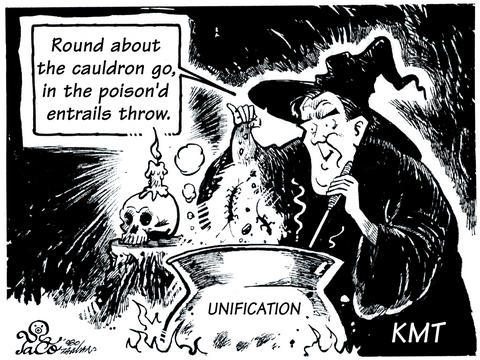¡@
Atayal woman revives full facial tattooing tradition
STAFF WRITER, WITH CNA
Tuesday, Jan 22, 2008, Page 2
 |
| Shayun Foudu and her husband show off their facial
tattoos in Hualien County yesterday. PHOTO: CNA |
A woman from the Atayal tribe in the east has had an elaborate tattoo ingrained
on her face, marking the first time an Aboriginal woman in Taiwan has had her
face tattooed in nearly a century.
The 33-year-old woman, Shayun Foudu, had the shape of a large "V" tattooed on
her face during the weekend at a tourist resort in Taroko National Park in
Hualien County.
"Facial tattooing is an old cultural tradition of the Atayal tribe. I feel very
proud to have a tattoo on my face," Shayun Foudu told reporters.
Japanese colonial rulers banned the traditional custom 95 years ago, but the
government does not outlaw the practice today. The custom of tattooing faces is
believed to date back about 1,400 years and was practiced by several of the
nation's Aboriginal tribes.
Foudu said that traditionally, Atayal women would have their faces tattooed
after their first period. When a young Atayal man was marrying his young bride,
the man would also have his face tattooed as a propitious sign of the couple's
wish to have a long-lasting marriage, she said.
Foudu, a native of Fuhsing Township (´_¿³), Taoyuan County, said that she and her
Atayal husband both have facial tattoos and are proud to "finally have done
something" to help preserve an Atayal tradition.
The tattoo artist used modern tattooing techniques to put the pigments on
Foudu's face. The process took two hours. In old days, tattooing was done with
needles, with ashes applied to the wounds, in a painful process.
Facial tattooing had also been a tradition of other indigenous groups, including
the Amis, but Atayal tattoos are especially well-known, partly because it was
widely practiced and the tattoos covered practically the entire face.
Specialists say the practice was used for several purposes, including as a way
for Atayal ancestors to identify and protect later generations. Tattoos also
served as marks of honor for men who were skilled in headhunting, while in women
they represented the attainment of skills such as weaving.
The tradition is rapidly disappearing, however, and some Atayals are trying to
record the history of face tattooing before the older generation dies.
Foudu said she hopes her and her husband's actions will help society adopt an
open mind about facial tattoos.

Oh silence,
most despicable silence
Tuesday, Jan 22, 2008, Page 8
Soon after Beijing made its successful bid to host the Olympic Games, human
rights organizations, academics and some publications intensified their scrutiny
of the manner in which the Chinese state apparatus was dealing with dissent,
media freedoms and human rights in general.
But while this happened, governments did not follow suit and failed to voice
official objections to the fact that Beijing has broken most of its promises.
Just last week, reports that Beijing was requesting that Chinese nationals who
obtained tickets for the opening and closing ceremonies submit personal
information and a recent photograph -- developments that should have raised
eyebrows in world capitals -- passed with little comment.
Under the pretense that the scheme would "eradicate fake tickets [and] control
speculative ticket reselling," what Beijing is doing is collecting background
data on everybody who will be at the Olympic venue at a time when the world's
media will be looking its way. Anyone whom the security apparatus suspects could
create "image problems" of the type that were seen at Tiananmen Square in 1989
will be screened out beforehand and be unable to attend the "celebrations."
In a way, this new scheme is just an extension of Beijing's police-state-like
preparations for the games, in which foreign "allies" -- which for months have
provided it with lists of people and organizations that may cause "trouble"
should they participate at the Olympics -- have been complicit.
Perhaps even more troubling is the fact that states -- especially Western
democracies that, on paper at least, would be expected to behave more
responsibly than China -- seem to find it increasingly difficult to openly talk
about human rights abuses, even among themselves.
A prominent example of this is Canada's decision to rewrite the manual on
torture it produces for its diplomats after the US and Israel complained that
their countries had been listed among the states that employ such practices.
Rather than defend the authors of the report or explain his government's
position on the matter, Canadian Minister of Foreign Affairs Maxime Bernier said
the list had "mistakenly" included the two countries and did not represent the
official view in Ottawa.
The document -- which was obtained by Amnesty International -- was summarily
recast as an embarrassment, at best a mere rag to "stimulate discussion and
debate." Its new version, Ottawa promised, will not include Israel and the US.
Case closed.
Next thing you know, Beijing, too, will be complaining about its inclusion on
the rogues' gallery of torturers or, as Jerusalem and Washington did, it will
split hairs and argue that waterboarding and sleep deprivation do not constitute
torture.
One by one, in the name of good relations, names will be removed from lists --
those that are made public, at least -- to ensure that no allied government is
insulted by the truth.
It is altogether deplorable that in this day and age governments would abandon
the human rights discourse -- except for cynical purposes, such as to provide a
post facto rationale for the invasion of Iraq, or in the ongoing campaign to
isolate Iran.
What this means for all those hapless dissidents or suspects who face torture,
unjust imprisonment and other forms of humiliation is that they should no longer
place their hopes in governments. Not even the supposedly "good" ones.
South Africa faces energy,
climate crisis
¡@
The environment ministry warns it will no longer
tolerate poor environmental standards that have allowed the nation to enjoy the
cheapest 'dirty, coal-fired energy' in the world
By Clare Nullis
AP, CAPE TOWN
Tuesday, Jan 22, 2008, Page 9
¡@
|
|
As pressure mounted on South Africa's electricity
provider to stop crippling and unpredictable blackouts that cause daily misery,
the environment minister said on Friday the era of cheap coal-based energy must
end.
Fears for economic growth and investment must be set against the risks to future
survival posed by climate change on the continent least equipped to cope, said
Marthinus van Schalkwyk, outlining the dilemma faced by many developing
countries.
"In Africa, people simply try to survive, but more and more people realize that
climate change is an issue of survival," he said.
Peasant farmers are already feeling the squeeze, he said.
The western part of South Africa faces increasing drought and declining crop
yields, according to climate projections, while the eastern part risks more
torrential rain and flood-related devastation.
South Africa has the cheapest "dirty, coal-fired energy" in the world, at R0.12
(US$0.02) per kilowatt/hour, compared with wind-powered energy at R0.46 and
solar energy at R0.57, the minister said. Even in sunny, windy Cape Town,
renewable energy is in its infancy.
An experimental wind farm has been set up on the coast and city authorities have
tested solar powered traffic lights in a bid to reduce traffic snarls and
accidents caused when the lights go off during power outages.
Cape Town has been spared the worst of the daily power cuts gripping many other
parts of South Africa. The economic heartland of Gauteng, which includes
Johannesburg and Pretoria, have been particularly badly hit.
South Africa's Human Rights Commission added its voice on Friday to the mounting
protests against Eskom, the electricity provider. It said it would join with the
Public Protector -- a consumer ombudsman -- and investigate why Eskom had
introduced sweeping power cuts, which have had such a devastating impact on the
government's campaign to improve service delivery.
"It has become a serious national embarrassment and could have a major impact on
economic growth and job creation," the main trade union movement Cosatu said.
Business Unity South Africa, which represents the corporate world, on Thursday
said the power cuts were costing millions and had "no end in sight."
This had eroded local and international confidence in South Africa, the
organization said.
It voiced special concern over Eskom's reported warnings that big business
projects -- such as proposed mining projects and aluminum smelters, should be
put on hold for at least five years.
"The implications of the scenario recommended by Eskom will reduce business
confidence; discourage new investment and capital expansion programs negatively
affecting growth," said the organization's chief executive, Jerry Vilakazi.
What has most upset South Africans is that the power cuts usually hit without
warning. Even though Eskom publishes schedules of planned outages, critics say
the company rarely sticks to them.
The Johannesburg newspaper, the Star, had a blackened front page on Friday with
a candle in the mast head and a banner headline "Week Joburg Plunged into Dark
Ages." It featured tales of electricity woes from across the city, including a
story of a man undergoing a complicated operation on his carotid artery when the
power failed and a woman held up at gunpoint when her electric gate wouldn't
open.
There have been reports that South Africa's already rampant crime -- has surged
in the past week as criminals take advantage of the blackouts.
Hardest hit are small businesses -- such as hairdressing salons which have sent
clients to sit in the sun to let their hairstyles dry; pet shop owners whose
exotic fish have died; meat and dairy stores which have had to dump their
produce.
Radio talk shows have been buzzing with irate callers for weeks, and traffic
snarls around Johannesburg, already bad, have become unbearable.
Eskom says the outages are not its fault, attributing it to a lack of government
foresight and planning years ago.
The company is building new coal-fired power stations -- which should be ready
by 2013 -- and bring obsolete ones back into service. It is also constructing a
second nuclear powered station near Cape Town.
But van Schalkwyk warned the power company that the government would no longer
turn a blind eye to poor environmental standards.
"They must not expect the same leniency with regard to environmental standards
that applied in the past," he said.
"We cannot continue to simply rely on fossil fuels for energy generation," he
said.
¡@